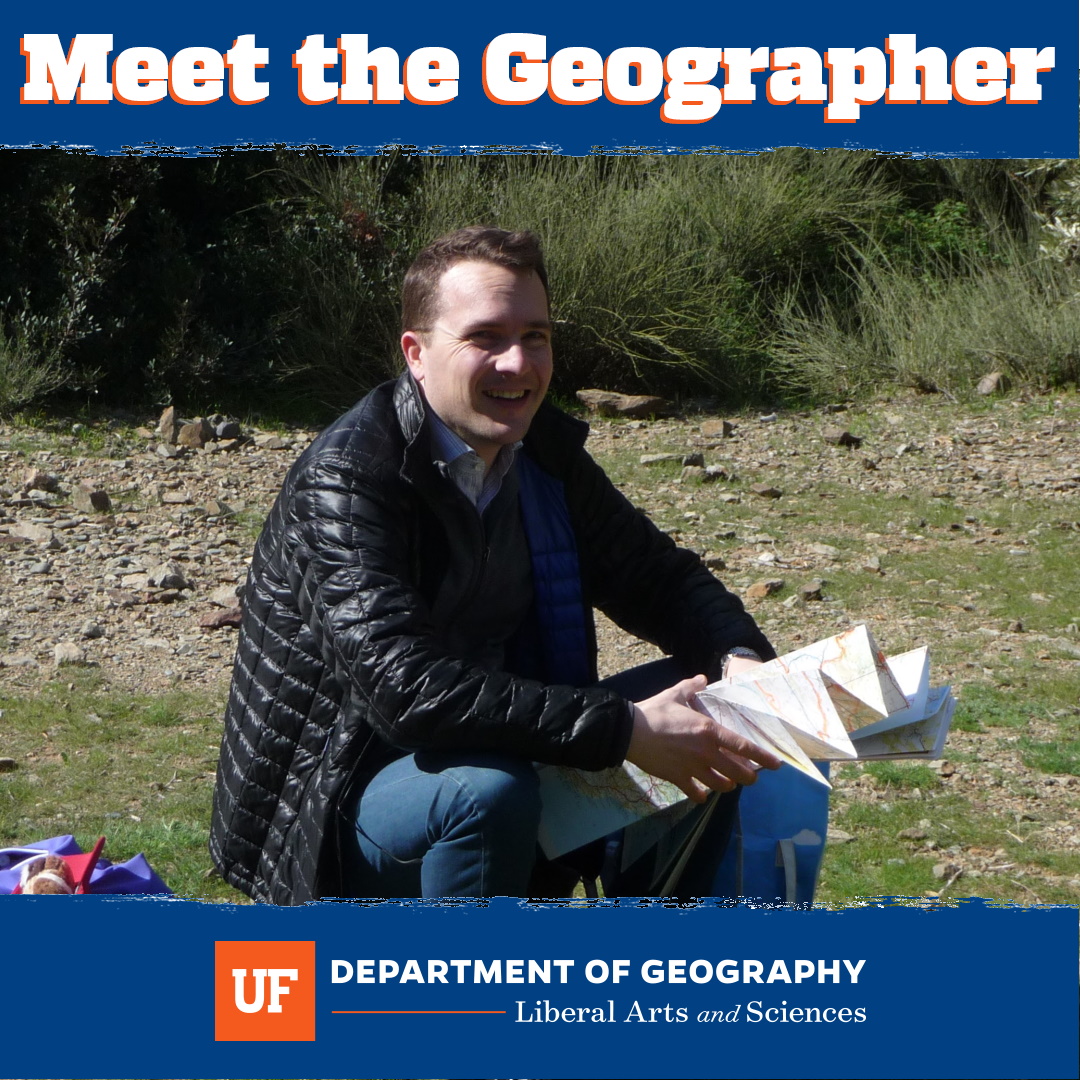
Dr. Olivier Walther
Assistant Professor of Geography
Affiliate Faculty, Center for African Studies
Affiliate Faculty, UF Center for Global Islamic Studies
Founder and Coordinator, African Networks Lab
Faculty Member, Sahel Research Group
University of Florida
Focus Areas
Research Statement:
My research focuses on trade and political violence in West Africa. Using social network analysis, I study how informal traders have adapted to transformations affecting the global economy by developing transnational networks that rely on ethnic, religious, or business ties. I am also interested in understanding how violent extremist organizations operate using pre-existing social networks, how they extend their activities across borders, and what are their connections to insurgencies in Africa.
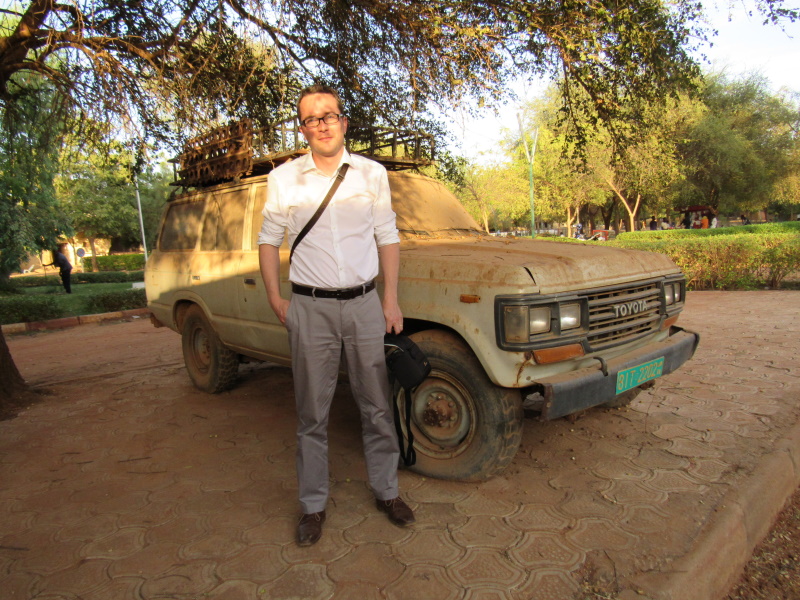
Who is he?
Dr. Olivier J. Walther is an Assistant Professor in the Geography Department. He is a social networks scientist who conducts research on transnational networks in Sub-Saharan Africa. He’s particularly interested in trade and political violence networks in the Sahel. Olivier is also affiliated with the Center for African Studies, the Center for Global Islamic Studies, African Networks Lab, and the Sahel Research Group. Prior to his current position, Olivier worked as a researcher at the Luxembourg Institute of Socio-Economic Research and held faculty appointments at both the University of Southern Denmark and Rutgers University.
How did he get here?
Olivier grew up in a Francophone household that values education – his parents are both teachers – his mother teaches kindergarten and his father is a professor of Physical Geography. He spent his early years in Lausanne, Switzerland.
When Olivier was ten years old, his father took a two year position at the University of Niamey, in Niger. Niamey was a peaceful, cosmopolitan city, where many cultures met. The move from Switzerland to Niger opened Olivier’s eyes to a great diversity of cultures and lifeways. After two years in Africa, the Walther family returned to Switzerland, but Olivier was convinced that he would make his way back to the Sahel.
Most students in Switzerland attend the local university – they are all highly selective and recruit students from the surrounding communities. When Olivier graduated from High School, it was natural that he would attend the local University of Lausanne, where he completed both Bachelor of Science and Master of Science degrees in Geography. Upon completing his Master’s degree, Olivier moved to the University of Geneva, where he earned a postgraduate diploma in Development Studies. He then returned to the University of Lausanne and the University of Rouen for a joint doctoral program in Geography. Throughout these studies, Olivier focused on development and trade issues in West Africa, conducting field work in the Sahel each year of his PhD.
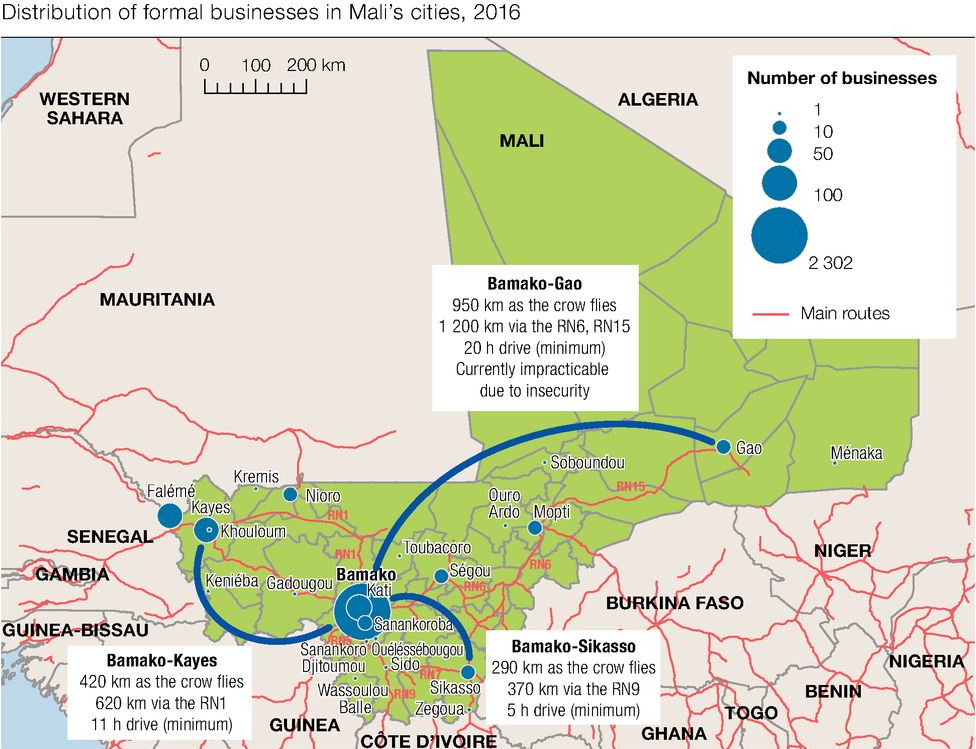
Surveying social networks is very different from traditional polling, because the connections between people are what’s important. In order to accurately map a social network, researchers need to interview 80% or more of the members of the network. This can be challenging in a multinational, multiethnic, multilingual environment, under the best of circumstances. Adding bad roads, corrupt officials, and criminal activity makes it a Herculean effort. “I’ve spent lots of time in remote places in Africa,” says Olivier, “border regions tend to be far from major cities. There are lots of challenges – different languages, different regulations, lots of borders, and lots of border officials.” By forging close ties with local researchers and being very patient, Olivier has collected the largest social network ever mapped in West Africa, encompassing over 1,000 people from 3 countries, spanning more than 600 miles.
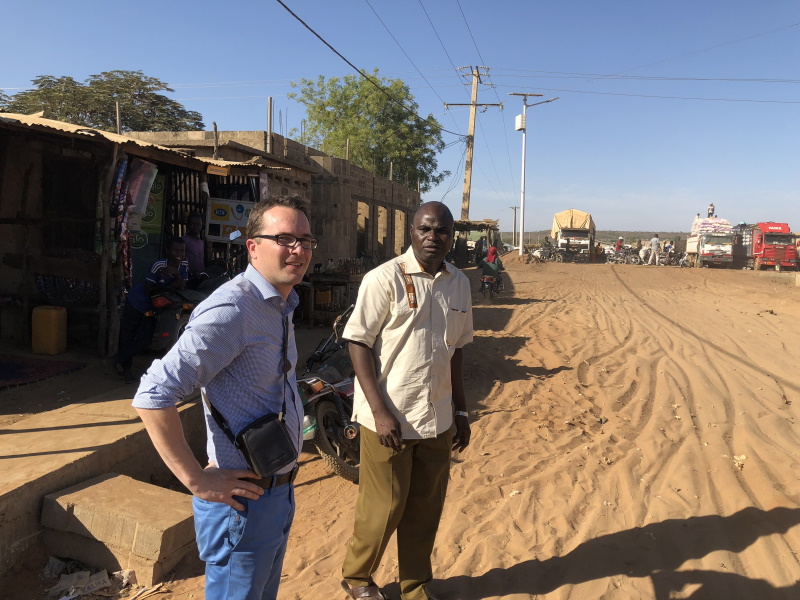
Even with support from local colleagues and deep experience in the Sahel, field work provides huge challenges. Olivier has had more than one run in with local officials: “Once in Nigeria, I was supposed to interview the chairman of a local community across the border and nearly ended up in jail. I didn’t have the right visa but knew the border officials and was used to traveling back and forth without difficulties. One day, the custom chief arrested me and threatened to put me in prison for lack of the right papers. Everything was sorted with a few naira bills (the local currency) and a lot of time.” New researchers may want to try research further west or east – in Senegal or Kenya – before tackling field work in rural Nigeria.
Upon earning his PhD, Olivier moved to Luxembourg where he worked as a Senior Researcher in the Department of Geography at the Luxembourg Institute of Socio-Economic Research (LISER). While at LISER, Olivier primarily focused on European studies questions, writing papers like Cross-border metropolitan integration in Europe: the case of Luxembourg, Basel and Geneva in Environment and Planning. He was eventually able to win a grant that allowed him to resume his work in Africa. At this time, Olivier discovered that he could apply his network analysis tools to transnational terror networks, publishing Islamic terrorism and the Malian rebellion in Terrorism and Political Violence
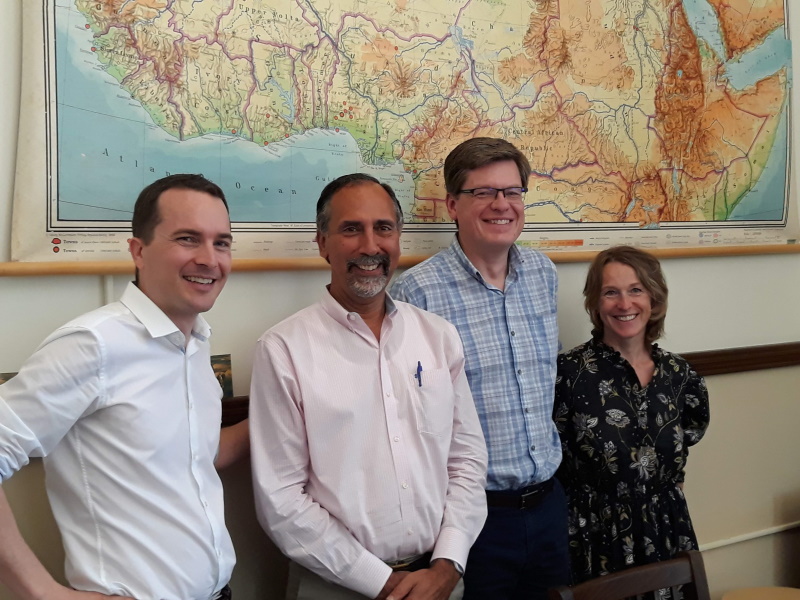
While at LISER, Olivier cultivated an international network of collaborators, colleagues, and mentors, which ultimately led to an invitation to join the Division of Global Affairs at Rutgers University in New Jersey, as a Visiting Assistant Professor. Olivier enjoyed his experience at a large, public, American university, but the position was not permanent.
After a year at Rutgers, Olivier was offered a tenured faculty position as an Associate Professor, in the Center for Border Region Studies and Center for War Studies at the University of Southern Denmark in Sønderborg, Denmark – the largest border studies program in Europe. At the Center for Border Region Studies, Olivier continued his work on West African trade networks, publishing many papers including Trade networks in West Africa: A social network approach in the Journal of Modern African Studies and West African spatial patterns of economic activities: combining the ‘spatial factor’ and ‘mobile space’ approaches in African Studies.
What’s he been doing at UF?
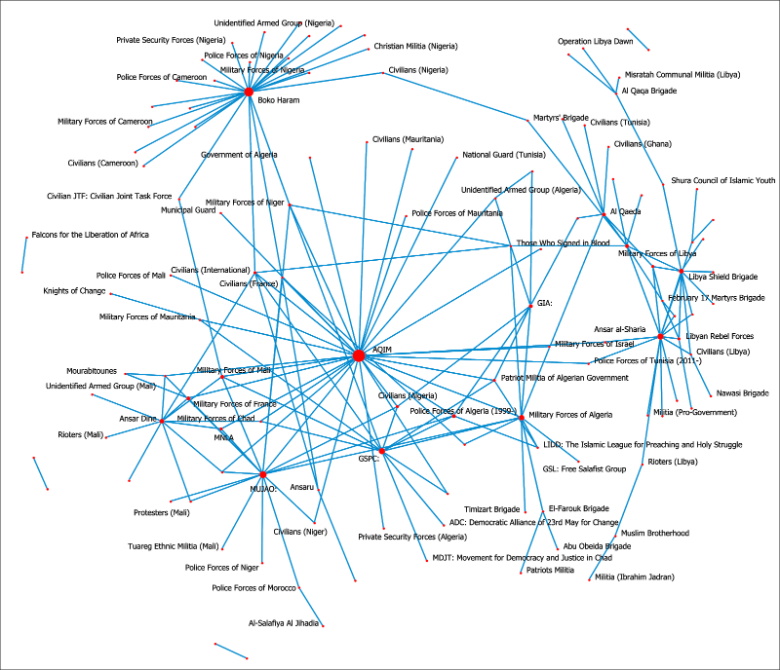
After three years at the University of Southern Denmark, Olivier won a multi-year grant from the OECD in 2017 that allowed him to go to any institution he wanted. Dr. Leonardo A. Villalón invited Olivier to join the Sahel Research Group as a Visiting Associate Professor in the Center for African Studies at the University of Florida. It wasn’t long before we realized that Olivier was a GeoGator and that his network analysis skills had a clear home in the Department of Geography. He joined the department as an Assistant Professor in 2019.
It has always been Olivier’s goal to put together a comprehensive theory of space and networks and to do research that will make a difference in the world. For the first time he has been able to map accessibility in West Africa considering distance, road conditions, border checkpoints, bribes, and more. This research has convincingly argued in favor of opening borders to increase trade which Olivier hopes will drive policy change.
Social networks aren’t just trade – they’re also political networks. Violent organizations and individuals are connected through cooperation and also conflict. With Dr. Steve Radil and Mr. David Russell, Oliver has mapped networks of violence in West Africa over the last 20 years. They have analyzed alliances, conflicts, impacts on civilians, and how military interventions affect political violence networks.
Here in the United States, there’s a vibrant community of researchers and lots of interested government officials incentivizing this kind of research. There is no better place to research terrorism than in the US. Olivier’s group has assembled fresh data about 40,000 individual violent events and even more relationships, all from publicly available records such as those from the Armed Conflict Location & Event Data (ACLED) Project. This large and unique data set allows them to map the spatial and temporal evolution of networks containing hundreds of violent organizations .
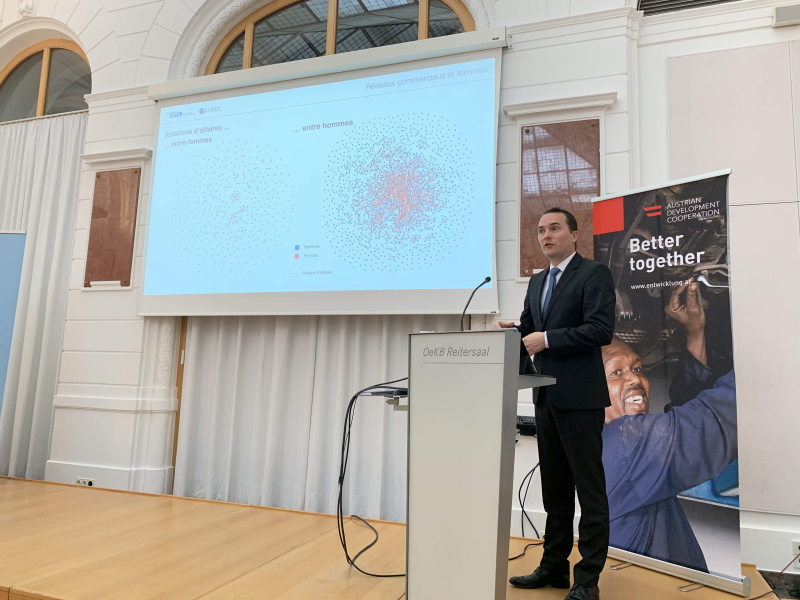
Olivier is the principal investigator of an ongoing research project on conflict in North and West Africa funded by the OECD ($ 311,000, 2019-2020) which has resulted in The Geography of Conflict in North and West Africa, which Mr. Angel Gurría, Secretary-General of the OECD presented at the Munich Security Conference (MSC) in February of this year. He has received funding from NASA as co-investigator for a project on urbanization, agriculture and deforestation in Ghana ($660,000, 2020-23). Last month, he received funding from the OECD to develop a four-year research program that addresses political security in North and West Africa.
He has also kept up a sprightly rate of publications since arriving at UF, recently publishing Uncovering the internal structure of Boko Haram through its mobility patterns in Applied Network Science and Mapping travel time to assess accessibility in West Africa: The role of borders, checkpoints and road conditions in Journal of Transport Geography among many others.
With over 100 published articles, chapters, and books, Olivier is also the Africa Editor of the Journal of Borderlands Studies (JBS), a “chief” of the African Borderlands Research Network (ABORNE) and on the advisory board of the African Governance and Space (AFRIGOS) project. He is also on the editorial board of Connections, the journal of the International Network for Social Network Analysis.
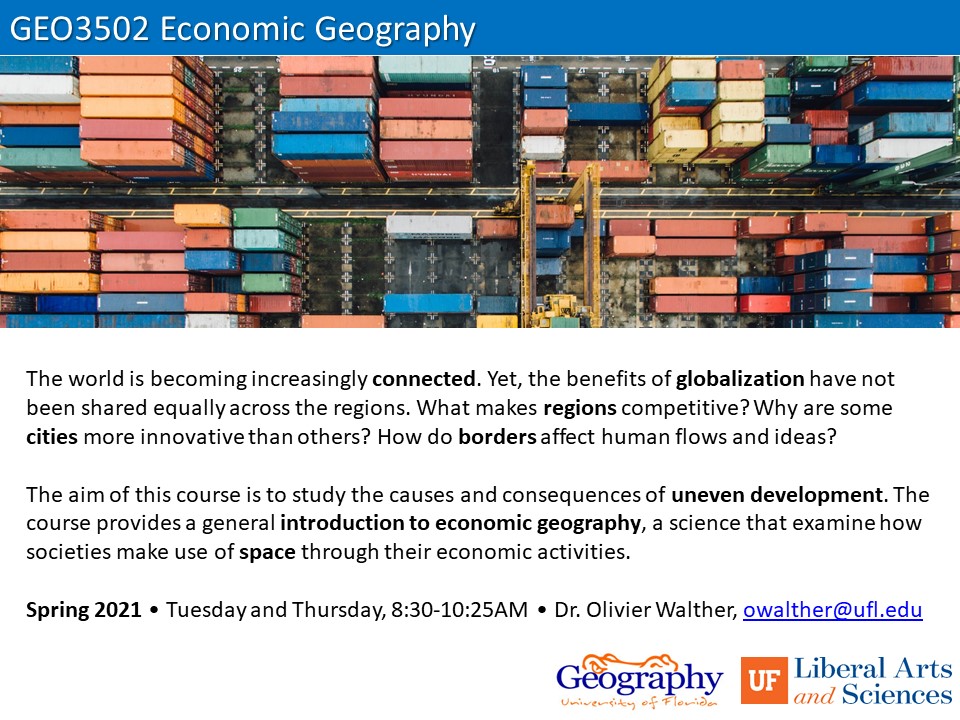 Olivier has enjoyed teaching Economic Geography GEO3502.
Olivier has enjoyed teaching Economic Geography GEO3502.
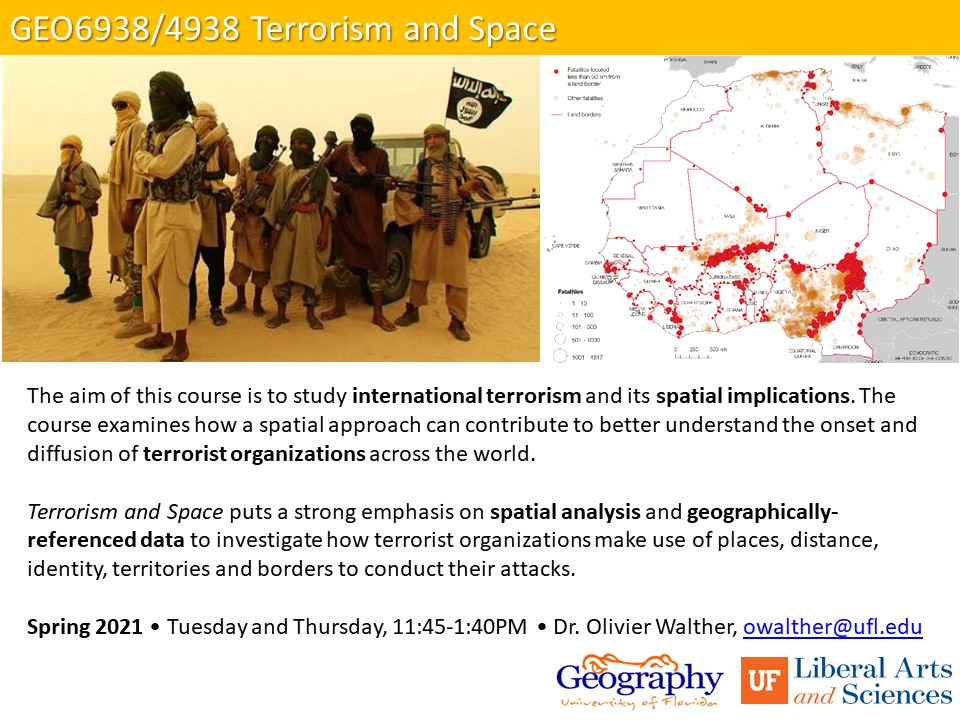 In the Spring he will start a new course Terrorism and Space GEO6938/4938 that will introduce students to the systemic study of international terrorism and its spatial implications. The course will critically discuss the dual concerns for geography as an influence on and a source of terrorism. Students will first discuss the origins of contemporary terrorism as well as the various motivations of ideologically-oriented, ethno-nationalist, and religious organizations. After providing a theoretical foundation, they will examine how a spatial approach can contribute to better understand the diffusion of terrorist organizations across the world, with a particular focus on Africa.
In the Spring he will start a new course Terrorism and Space GEO6938/4938 that will introduce students to the systemic study of international terrorism and its spatial implications. The course will critically discuss the dual concerns for geography as an influence on and a source of terrorism. Students will first discuss the origins of contemporary terrorism as well as the various motivations of ideologically-oriented, ethno-nationalist, and religious organizations. After providing a theoretical foundation, they will examine how a spatial approach can contribute to better understand the diffusion of terrorist organizations across the world, with a particular focus on Africa.
How has he been holding up during the pandemic?
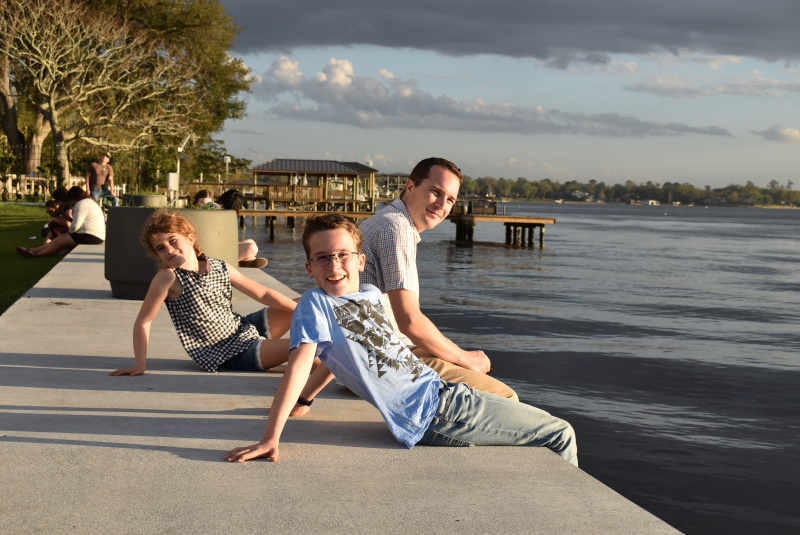
Olivier and his family have appreciated moving to the University of Florida. Throughout all his moves, this has been the first time they could choose where they wanted to live, instead of following available jobs. They bought a mid century house here in Gainesville in 2019 and are pleased to have many projects to keep them busy and enough room for Olivier, his wife, and his two kids to all be able to work from home. The family has been spending a lot of time with each other – working together on their house as well as exploring hiking trails around Paynes Prairie.
Follow Olivier on:
Twitter, LinkedIn, Facebook, Google Scholar, and Academia.
Olivier’s website – UF African Networks Lab
Credit: Mike Ryan Simonovich